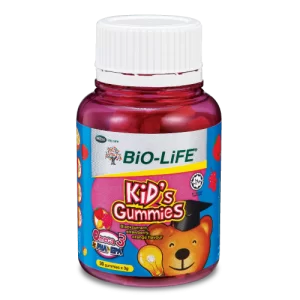
The Brain Nutrition for Children – DHA
Oct 3, 2022
Introduction
Do you know that omega-3 is the essential fatty acid that helps to feed the brain and keep it healthy? Omega-3 could help to determine the brain’s integrity and ability to perform. Over 60% of the brain is made up of fat, and 10%–20% is omega-3 fatty acid DHA. 1 Like bones need calcium; the brain needs DHA as it is the brain’s nutrition. However, our body cannot synthesize essential fatty acids, which must be obtained from dietary sources.
Childhood is a period of brain growth and maturation. The primary growth phase for the human brain in terms of brain weight is during the period from birth to 2 years old. 2 However, certain areas of the brain are not fully developed by the age of 2. Thus, brain development and growth would continue throughout childhood and adolescence. At this time, the brain is more focused on developing higher-order cognitive activities such as planning, problem-solving and concentrated attention.
It is suggested that the consumption of DHA might help to improve the following:

Verbal learning

Memory

Spelling ability

Reading ability

Cognitive performance
The extent to how much the brain grows and matures during the childhood period will impact children’s lives forever. That’s why it is essential to ensure that children have all the proper nutrition to grow strong and well.
Omega-3 fatty acids can be found in deep-sea fish like salmon, mackerel, and anchovies. It can also find it in nuts, seeds, plant oils, and leafy green vegetables. However, those picky eaters might lack the chance of getting enough essential fatty acids through diet. Clinical studies have shown the relationship between an imbalance in dietary intake of fatty acids to impaired brain performance. 3
As an alternative, it is recommended that children take essential DHA and EPA, which can obtain from Kid’s Gummies Omega 3 + DHA & EPA. Get Kids Gummies Omega 3 + DHA & EPA to provide 15mg of DHA and 3mg of DHA with three yummy flavours!

For more information, visit Kid’s Gummies Omega-3 + DHA & EPA
References
- Weiser, M. J., Butt, C. M., & Mohajeri, M. H. (2016). Docosahexaenoic acid and cognition throughout the lifespan. Nutrients, 8(2), 99.
- Kuratko, C. N., Barrett, E. C., Nelson, E. B., & Norman Jr, S. (2013). The relationship of docosahexaenoic acid (DHA) with learning and behavior in healthy children: a review. Nutrients, 5(7), 2777-2810.
- Chang, C. Y., Ke, D. S., & Chen, J. Y. (2009). Essential fatty acids and human brain. Acta Neurol Taiwan, 18(4), 231-41.



